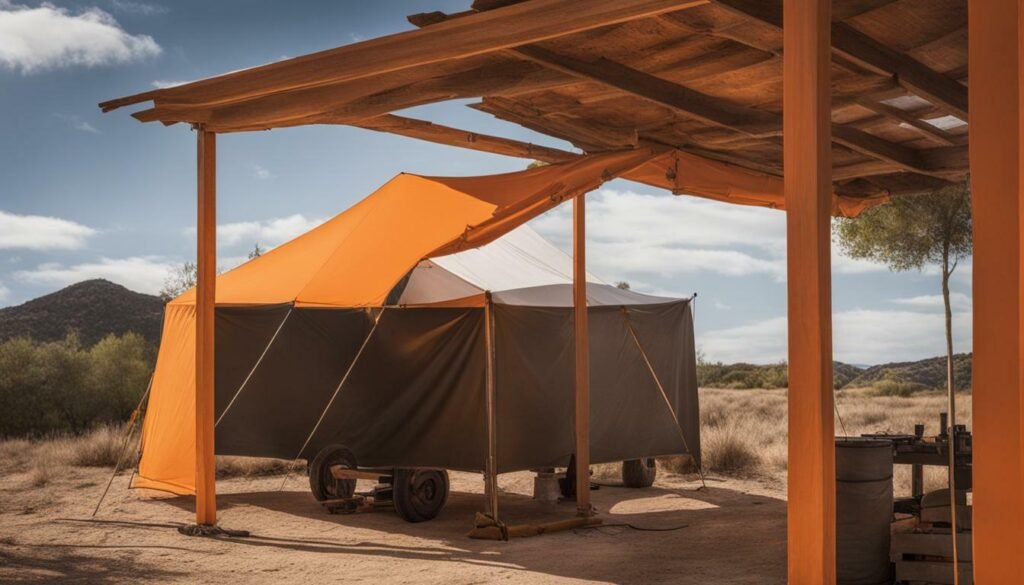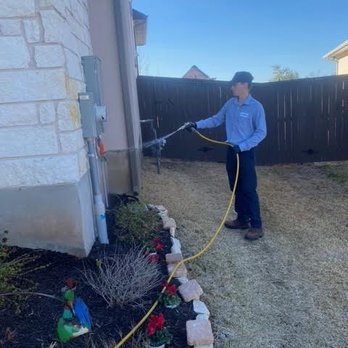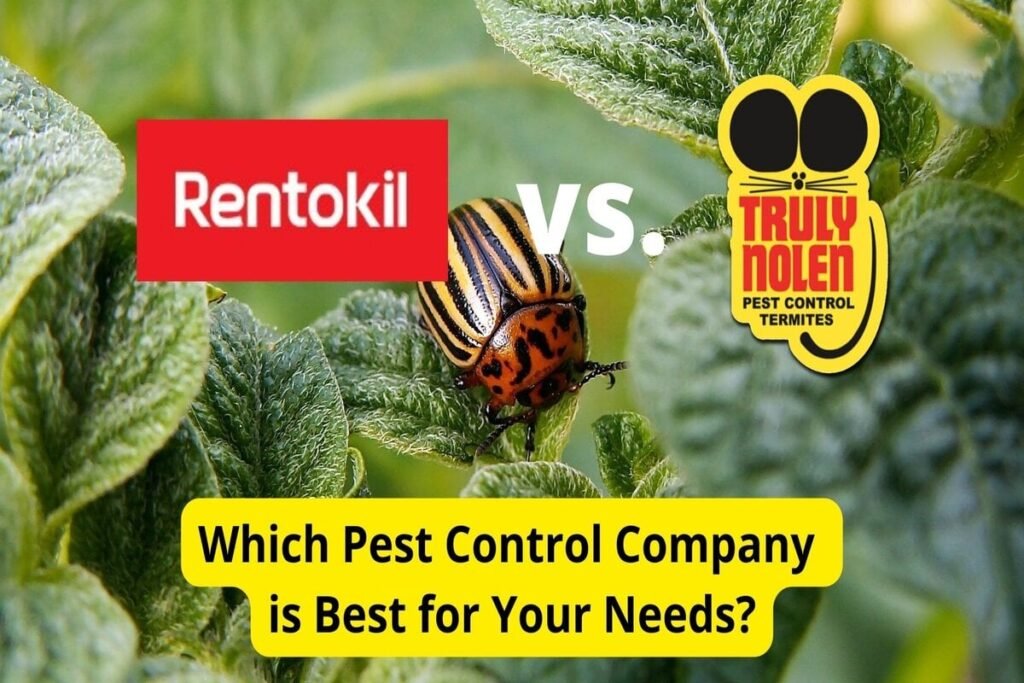When it comes to termite infestations, two popular treatment options to consider are orange oil termite treatment and tenting. Each method has its own unique benefits and considerations, making it important to understand the differences in order to make an informed decision for your termite problem.
Key Takeaways
- Orange oil termite treatment involves injecting orange oil into termite galleries and is effective for drywood termites.
- Tenting guarantees complete eradication of drywood termites by fumigating the entire structure with Vikane gas.
- Orange oil treatment is non-toxic, eco-friendly, and allows you to stay in your home during treatment.
- Tenting requires you to leave your home for several days and may result in tree trimming or potential roof damage.
- The choice between orange oil treatment and tenting depends on the extent of the infestation, type of termites, and your personal preferences.
Now that you have an overview of these two treatment options, let’s dive deeper into the details of orange oil termite treatment in the next section.
What is Orange Oil Termite Treatment?
Orange oil termite treatment is a natural and non-toxic alternative for controlling drywood termite infestations. It involves drilling into infested wood and injecting orange oil directly into termite galleries, where it acts as a powerful solvent, destroying the termites’ exoskeletons and eggs. The oil is derived from orange peels and contains an active compound called d-limonene, which is toxic to termites but safe for humans, pets, and the environment.
One of the main advantages of orange oil treatment is its eco-friendliness. Unlike traditional chemical pesticides, it does not release harmful toxins into the air or contaminate soil and water sources. Additionally, it is a non-invasive method that does not require homeowners to move out during treatment or remove plants, furniture, or pets from the premises.
Orange oil termite treatment is a natural and non-toxic alternative for controlling drywood termite infestations.
However, it’s important to note that orange oil treatment may have limitations. While it effectively kills termites in treated areas, it may not reach the entire termite colony. This means that untreated termites elsewhere in the structure can continue to cause damage. It is generally recommended for localized infestations and as a preventive measure rather than a solution for severe, widespread termite problems.
To visualize the comparison between orange oil treatment and tenting, refer to the table below:
| Treatment Method | Efficacy | Green/Non-toxic | Convenience | Disruption |
|---|---|---|---|---|
| Orange Oil Treatment | Localized | Yes | No need to vacate | Minimal |
| Tenting | Guaranteed eradication | No | Temporary relocation required | Potential for landscape damage |
Ultimately, the choice between orange oil treatment and tenting depends on the extent of the infestation, the type of termites, and the homeowner’s preferences. For smaller, localized infestations, orange oil treatment can be a safe and effective option. However, for extensive infestations or when complete eradication is required, tenting may be necessary to ensure all termites are eliminated.


How Does Orange Oil Termite Treatment Work?
Orange oil termite treatment works by drilling into infested wood and injecting orange oil into termite galleries, effectively eliminating drywood termites. The orange oil contains a compound called d-limonene, which acts as a powerful solvent and dissolves the exoskeleton of termites, causing dehydration and ultimately death. This natural termite control method is non-toxic to humans and pets, making it a safe and eco-friendly alternative to traditional chemical treatments.
The process starts with a thorough inspection of the property to identify the location of termite infestations. Once the infested areas are pinpointed, small holes are drilled into the wood and the orange oil is injected directly into the termite galleries. The oil spreads through the galleries, reaching termites that may be hidden deep within the wood. Over time, the orange oil penetrates the termite population, effectively eradicating the infestation.
While orange oil termite treatment can be highly effective for targeted areas, it is important to note that it may not reach the entire termite colony. This treatment primarily targets the termites in the treated wood, but it may not eliminate termites in untreated areas or those that have spread to other parts of the structure. Therefore, it is crucial to assess the extent of the infestation and consult with a professional to determine if orange oil treatment is suitable for your specific situation.
| Pros of Orange Oil Termite Treatment | Cons of Orange Oil Termite Treatment |
|---|---|
| – Non-toxic and eco-friendly | – May not reach the entire termite colony |
| – Safe for humans and pets | – Limited effectiveness for widespread infestations |
| – No need to vacate the property during treatment |


The Effectiveness of Orange Oil Termite Treatment
“Orange oil termite treatment has been proven to be a viable option for drywood termite control. It is particularly effective for localized infestations and can provide an eco-friendly alternative to chemical fumigation.” – Dr. Sarah Anderson, Entomologist
When considering termite treatment options, it is important to weigh the advantages and disadvantages of orange oil treatment against alternative methods such as tenting. Factors such as the extent of the infestation, the type of termites, and individual preferences should be taken into account. Consulting with a professional pest control company can help assess the situation and determine the most suitable course of action for effectively controlling termite infestations.
Benefits of Orange Oil Termite Treatment
Opting for orange oil termite treatment offers several benefits, including its eco-friendly and non-toxic nature, as well as the convenience it provides during treatment. Unlike traditional chemical treatments, orange oil is derived from orange peels and contains d-limonene, a natural compound that is effective in killing termites. This makes it a safe alternative for homeowners who are concerned about the use of harsh chemicals in their homes.
Not only is orange oil treatment environmentally friendly, but it also offers convenience during the treatment process. Since it is a localized treatment, there is no need to vacate the entire home or remove plants and pets during the process. This means that you can continue with your daily routine without major disruptions.
Furthermore, orange oil treatment targets drywood termites directly by injecting the oil into termite galleries, where the termites reside. This allows for a targeted and effective approach to eliminating the termites from infested areas. However, it’s important to note that orange oil treatment may not reach the entire termite colony, which could lead to reinfestations if untreated areas still exist.


| Benefits of Orange Oil Termite Treatment |
|---|
| Environmentally friendly and non-toxic |
| Convenience during treatment – no need to vacate the home or remove plants and pets |
| Targeted approach to eliminate termites in infested areas |
In summary, orange oil termite treatment offers several advantages for homeowners dealing with drywood termite infestations. Its eco-friendly nature, along with the convenience it provides during treatment, makes it an attractive option. However, it’s essential to consider the extent of the infestation and the homeowner’s preferences when deciding between orange oil treatment and other alternatives.
What is Tenting for Termite Control?
Tenting for termite control, also known as fumigation, is a process that involves covering and sealing a structure to eliminate drywood termites. This method is highly effective in eradicating termite infestations throughout the entire home, ensuring complete elimination of the pests. The process starts by enclosing the entire structure with a tent-like cover, creating an airtight seal. Once the structure is sealed, a fumigant called Vikane gas is injected into the space, filling every nook and cranny.


The Vikane gas penetrates deep into the wood, reaching areas that may be inaccessible to other treatment methods. It effectively kills the termites and their eggs, providing a comprehensive solution to the infestation. After a specified period, the gas is ventilated out of the structure, leaving no residue behind. This ensures the safety of the occupants upon re-entry into the treated area.
Advantages of Tenting for Termite Control:
- Guaranteed eradication: Tenting is known for its high success rate in eliminating drywood termites. The comprehensive fumigation process ensures that all termite colonies within the structure are effectively eradicated.
- Comprehensive treatment coverage: Unlike other methods that may only target specific areas, tenting reaches every corner of the home. This ensures that no termites are left behind and prevents re-infestation.
- Effective for severe infestations: Tenting is particularly beneficial for severe or widespread termite infestations. It can tackle large-scale infestations that may otherwise be difficult to control with localized treatments.
In conclusion, tenting for termite control is a highly effective method for eliminating drywood termites from your home. It offers guaranteed eradication, comprehensive treatment coverage, and is particularly effective for severe infestations. However, it is important to consider factors such as the need to vacate the premises during treatment and the potential risks to trees and roofs. Assessing the extent of the infestation, the type of termites, and your personal preferences will help you make an informed decision on whether tenting is the right choice for your termite problem.
| Termite Treatment Method | Efficacy | Convenience | Cost |
|---|---|---|---|
| Orange Oil Treatment | May not reach entire colony | No need to move out or remove plants/pets | Relatively affordable |
| Tenting/Fumigation | Guaranteed eradication | Requires vacating the premises | Higher cost |
How Does Tenting Work?
Tenting works by fumigating the entire structure with Vikane gas, ensuring the complete eradication of drywood termites. This method is highly effective in reaching all areas, including those that may be difficult to access with other treatment options. During the tenting process, a specialized tent is placed over the infested building, creating an airtight seal. Vikane gas is then released into the structure, penetrating deep into the wood and eliminating termites at all stages of their life cycle.
The gas is lethal to pests but leaves no residue, making it safe to use in residential areas. It has been extensively tested and proven to be effective in eradicating drywood termites, providing homeowners with peace of mind. Once the fumigation is complete, the tent is removed, and the structure is ventilated to ensure the gas disperses safely.
Image:
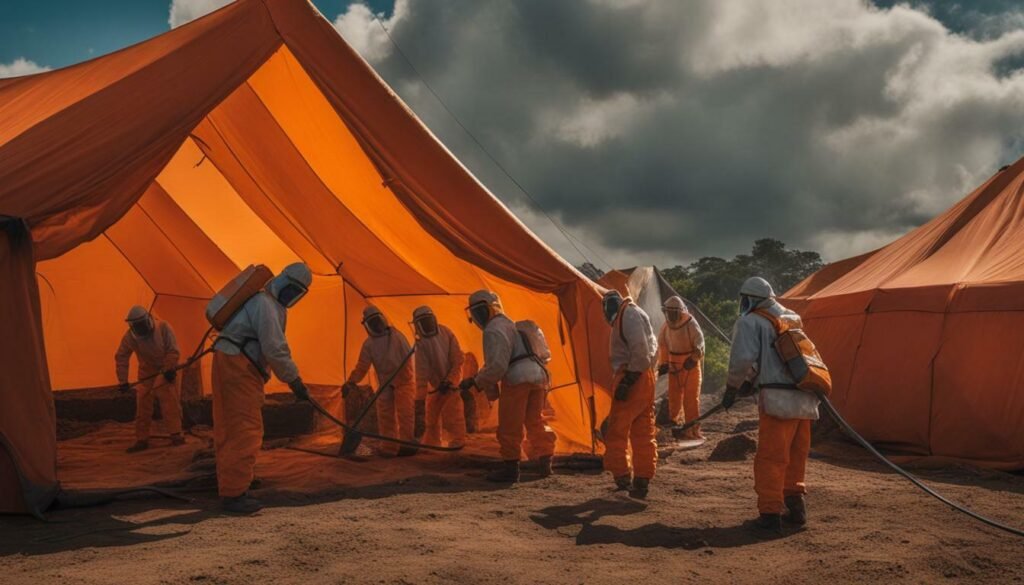

Ensuring Safety and Success
Tenting for termite control requires careful preparation and adherence to safety guidelines. Prior to the fumigation process, homeowners must vacate the premises along with their pets, plants, and any other living organisms. This is to ensure their safety as exposure to the gas can be harmful. It is also important to disconnect gas and electricity services to prevent any accidents.
During the tenting process, professional pest control experts carefully monitor the gas levels and ventilation to ensure that the treatment is successful. Once the treatment is complete, homeowners can return to their termite-free property, free from the worry of structural damage or further termite infestations.
Considering the Factors
When choosing between orange oil treatment and tenting, several factors should be taken into consideration. While orange oil treatment may be suitable for localized infestations and is a more eco-friendly option, tenting guarantees complete eradication of termites throughout the entire structure. The decision ultimately depends on the severity and extent of the infestation, the type of termites involved, and homeowner preferences. Consulting with a professional pest control expert can help determine the most appropriate method for addressing the termite problem and protecting your property.
| Tenting | Orange Oil Treatment |
|---|---|
| Guarantees complete eradication | Effective for localized infestations |
| Requires temporary relocation | No need to move out during treatment |
| Eliminates termites in the entire structure | Only kills termites in treated areas |
| Can result in tree trimming or roof damage | Minimal disruption to daily life |
Each method offers its own set of advantages and considerations. Making an informed decision based on your specific circumstances will ensure effective termite control and the long-term protection of your property.
Benefits of Tenting for Termite Control
Tenting for termite control offers several benefits, including the guaranteed eradication of termites and its effectiveness in treating severe infestations. With termite tenting, you can be confident that every nook and cranny of your home will be treated, ensuring complete elimination of these destructive pests. This method is particularly useful when dealing with extensive infestations that have spread throughout the structure.
During the tenting process, the entire home is sealed off and fumigated with Vikane gas. This powerful gas penetrates all areas, reaching termites in places that are difficult to access or hidden from sight. It provides a comprehensive treatment that targets the entire termite colony, eradicating not only the visible termites but also those hidden within the walls, floors, and other infested areas.
“Tenting for termite control is a highly effective method to combat severe infestations. It ensures that every corner of your home is reached and thoroughly treated, leaving no room for termites to survive.”
Another advantage of termite tenting is its ability to tackle severe infestations. If your home is heavily infested with termites, tenting becomes an ideal solution. The gas is able to penetrate deep into the infested areas, ensuring that even the most stubborn termites are eliminated. By opting for this method, you can be certain that your home will be termite-free.
| Benefit | Description |
|---|---|
| Complete eradication | Tenting guarantees the elimination of termites in your entire home, including hard-to-reach areas. |
| Effective for severe infestations | Tenting is highly effective in treating severe termite infestations that have spread throughout the structure. |
| Long-lasting results | Once the termites are eliminated, you can enjoy a termite-free home for an extended period, giving you peace of mind. |
Conclusion
When it comes to termite control, tenting offers a comprehensive and highly effective solution. It guarantees the complete eradication of termites, making it particularly suitable for severe infestations. However, it is important to consider factors such as the need to vacate the home during the process and potential additional requirements like tree trimming. Assessing the extent of the infestation, the type of termites, and your personal preferences will help you make an informed decision in choosing between orange oil treatment and tenting.


Factors to Consider When Choosing Between Orange Oil Treatment and Tenting
Choosing between orange oil treatment and tenting depends on factors such as the extent of the infestation, the type of termites, and homeowner preferences. Orange oil treatment is a suitable option for homeowners who have a smaller infestation of drywood termites and prefer a more eco-friendly and non-toxic approach. It involves drilling into infested wood and injecting orange oil directly into termite galleries, targeting and eliminating termites in treated areas.
Tenting, on the other hand, offers a guaranteed eradication of drywood termites in the entire structure. This method involves fumigation with Vikane gas, which effectively reaches all areas of the home. It is a more comprehensive solution for severe infestations and is particularly effective when dealing with hard-to-reach colonies.


When deciding between these two options, it is essential to consider the extent of the infestation. If the infestation is limited to a few areas of the home, orange oil treatment may be sufficient. However, if the infestation is extensive and widespread, tenting may be necessary to ensure complete eradication.
Additionally, the type of termites present should be taken into account. Orange oil treatment is most effective against drywood termites, while tenting is suitable for various types of termite infestations. Homeowners should also consider their preferences, such as the need to vacate the premises during treatment or the desire for a more eco-friendly solution.
| Factors to Consider | Orange Oil Treatment | Tenting |
|---|---|---|
| Extent of Infestation | Smaller infestations | Extensive and widespread infestations |
| Type of Termites | Drywood termites | Various types of termite infestations |
| Homeowner Preferences | Eco-friendly, non-toxic option | Guaranteed eradication, comprehensive treatment |
By considering these factors, homeowners can make an informed decision about the most suitable treatment option for their specific termite problem. It is advisable to consult with a professional pest control company to assess the infestation and provide expert recommendations.
Costs of Orange Oil Treatment vs Tenting
When considering orange oil treatment or tenting, it’s important to understand the associated costs and factors that can influence them. The cost of orange oil treatment for termite control can vary depending on the size of the infestation and the extent of the treatment required. On average, the cost of orange oil treatment can range from $8 to $20 per linear foot of treated area.
On the other hand, termite tenting, which involves fumigation with Vikane gas, tends to have a higher upfront cost. The cost of termite tenting can vary depending on the size of the structure and the severity of the infestation but generally ranges from $1,200 to $2,500 for a single-family home.
It’s important to note that these costs are just estimates and can vary depending on factors such as the location, accessibility of the infested areas, and additional services or treatments required. To get an accurate cost estimate for either treatment option, it’s best to consult with a professional termite control company who can assess the specific situation and provide a detailed quote.
| Factors | Orange Oil Treatment | Tenting |
|---|---|---|
| Efficacy | Effective for drywood termites in treated areas | Guarantees complete eradication of drywood termites in entire structure |
| Disruption | No need to move out or remove plants/pets | Requires leaving the home for several days, possible tree trimming or risk of roof damage |
| Reach | May not reach entire termite colony | Fumigation reaches all areas of the home |
| Cost | Average of $8 to $20 per linear foot of treated area | Average of $1,200 to $2,500 for a single-family home |
“The cost of termite treatment should not be the sole determining factor. It’s important to consider the efficacy, disruption, and reach of each treatment option.”
Ultimately, the choice between orange oil treatment and tenting will depend on various factors, including the extent of the infestation, the type of termites involved, and the homeowner’s preferences. While orange oil treatment may be a more cost-effective and convenient option for smaller infestations, termite tenting is often recommended for severe or widespread infestations where guaranteed eradication is crucial.
By weighing the costs, benefits, and other factors, homeowners can make an informed decision to effectively address their termite problem and protect their property from further damage.
Orange Oil Treatment vs Tenting: Making the Right Choice
Choosing between orange oil treatment and tenting for termite control is an important decision. It’s crucial to consider the costs, benefits, and factors unique to your situation. Consulting with a professional termite control company can provide valuable insights and guidance to help you make the right choice for your specific termite problem.


Making an Informed Decision for Your Termite Problem
When faced with a termite problem, it’s important to consider the efficacy, benefits, and costs of different treatment options like orange oil treatment and tenting, to make an informed decision. Both options have their advantages and disadvantages, catering to different needs and preferences.
Orange oil treatment offers a natural and eco-friendly alternative to traditional termite control methods. It involves drilling into infested wood and injecting orange oil into termite galleries, targeting drywood termites specifically. This non-toxic treatment option is convenient during application, as it does not require moving out of the property or relocating pets and plants. However, it’s important to note that orange oil treatment may only kill termites in the treated areas, and it may not reach the entire termite colony.
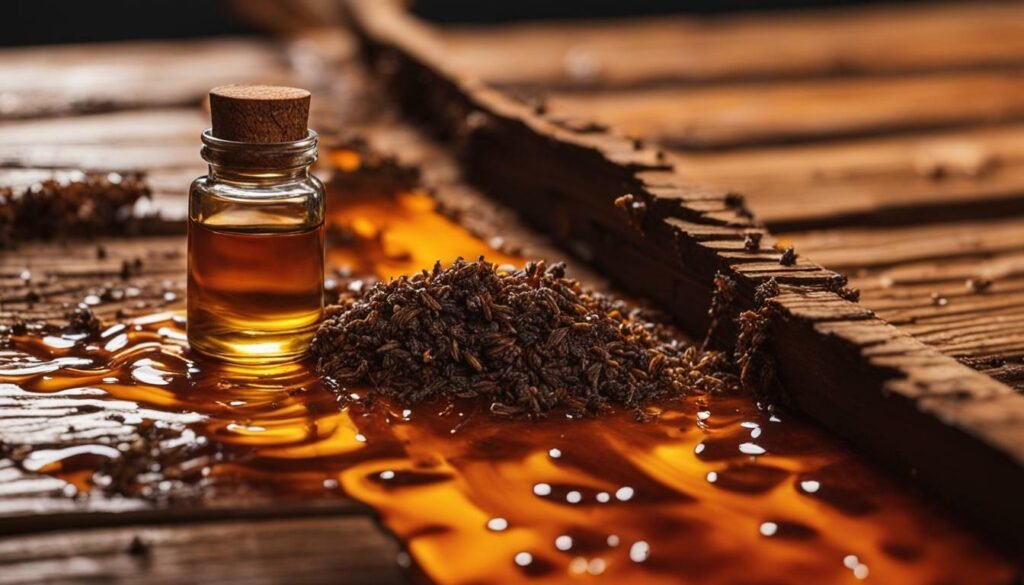

Orange oil treatment is effective for localized infestations and can be a suitable option for those who prefer a natural and non-toxic approach to termite control.
Tenting, on the other hand, guarantees complete eradication of drywood termites throughout the entire structure. This process involves fumigating the home with Vikane gas, which effectively reaches all areas, including hidden termite colonies. However, tenting requires the family to vacate the property for several days and may result in the need to trim trees or risk potential roof damage during the installation of the tent.
To determine the best course of action for your termite problem, consider factors such as the extent of the infestation, the type of termites present, and your personal preferences. If you have a localized infestation and prefer a natural approach, orange oil treatment may be a suitable option. On the other hand, if you have a severe infestation that requires comprehensive treatment, tenting may be the more appropriate choice. Consider consulting with a professional pest control company to assess your specific situation and provide expert advice.
| Orange Oil Treatment | Tenting | |
|---|---|---|
| Efficacy | Effective for drywood termites | Guaranteed eradication of drywood termites |
| Convenience | No need to vacate property or remove plants/pets | Requires family to leave home for several days |
| Coverage | Treats specific areas of infestation | Treats the entire structure |
| Cost | Varies depending on the extent of the infestation | Varies depending on the size of the property |
Ultimately, the choice between orange oil treatment and tenting depends on your specific needs and circumstances. Consider the advantages and disadvantages of each option and consult with professionals to ensure you make the most informed decision to effectively resolve your termite problem.
Conclusion
In the battle against termite infestations, both orange oil termite treatment and tenting offer effective solutions; the choice ultimately depends on the extent of the infestation, the type of termites, and personal preferences.
Orange oil treatment, a natural and non-toxic alternative, targets termite galleries by injecting orange oil into infested wood. It is an eco-friendly option that allows you to stay in your home during treatment, without the need to remove plants or pets. However, it may only kill termites in treated areas and may not reach the entire colony.
On the other hand, tenting guarantees complete eradication of drywood termites throughout your entire home. This is achieved through fumigation with Vikane gas, which effectively reaches all areas, ensuring no termite is left behind. However, the process of tenting requires you and your family to temporarily vacate the premises for several days. Additionally, it may result in the need to trim trees or risk potential damage to the roof.
When deciding between orange oil treatment and tenting, consider the extent of the infestation, the type of termites you are dealing with, and your personal preferences. If you have a localized infestation and prefer a non-toxic solution that allows you to remain in your home, orange oil treatment may be the ideal choice. However, if the infestation is widespread or severe, and you value the guarantee of complete eradication, tenting may be the more suitable option.
FAQ
Q: What is orange oil termite treatment?
A: Orange oil termite treatment is a natural and non-toxic alternative for controlling drywood termite infestations. It involves drilling into infested wood and injecting orange oil into termite galleries to kill the termites.
Q: How does orange oil termite treatment work?
A: Orange oil termite treatment works by targeting termite galleries and eliminating drywood termites. The orange oil is toxic to termites but safe for humans and pets. It is injected directly into the infested wood, where it kills termites on contact.
Q: What are the benefits of orange oil termite treatment?
A: Orange oil termite treatment offers several benefits. It is eco-friendly, non-toxic, and does not require you to move out during treatment or remove plants or pets. It is a convenient option that minimizes disruption to your daily life while effectively treating drywood termite infestations.
Q: What is tenting for termite control?
A: Tenting is a termite control method that guarantees complete eradication of drywood termites in an entire structure. It involves fumigating the home with Vikane gas, which reaches all areas and kills termites throughout the infested area.
Q: How does tenting work?
A: Tenting works by enclosing the entire structure in a tent and introducing Vikane gas. The gas penetrates all areas of the home, including walls, attics, and crawl spaces, killing termites throughout the infested area. It guarantees complete eradication of drywood termites.
Q: What are the benefits of tenting for termite control?
A: Tenting offers several benefits. It guarantees the complete eradication of drywood termites in the entire structure, providing comprehensive treatment coverage. It is highly effective for severe infestations and ensures that all termites are eliminated.
Q: What factors should I consider when choosing between orange oil treatment and tenting?
A: When deciding between orange oil treatment and tenting, you should consider the extent of the infestation, the type of termites, and your personal preferences. Orange oil treatment is suitable for localized infestations, while tenting is recommended for widespread or severe infestations.
Q: What is the cost of orange oil treatment vs tenting?
A: The cost of orange oil treatment and tenting can vary depending on factors such as the size of the infested area and the extent of the infestation. Generally, orange oil treatment is more cost-effective for localized infestations, while tenting may be more expensive but guarantees complete eradication for widespread infestations.
Q: How can I make an informed decision for my termite problem?
A: To make an informed decision for your termite problem, consider the efficacy, benefits, and costs of both orange oil treatment and tenting. Evaluate the extent of the infestation, the type of termites, and your personal preferences. Consulting with a professional termite control service can also provide valuable guidance.
Source Links
- https://www.wildwildpestcontrol.com/orange-oil-vs-fumigation-termite-treatments/
- https://kilaueapest.com/orange-oil-or-tenting/
- https://www.drtermites.com/orange-oil-or-tenting/
Your Expert in Animal Control and Extermination. Trust our experience for humane, effective pest management, protecting your property and ensuring peace of mind with Michael S.

